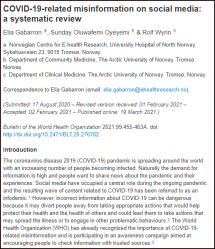COVID-19-Related Misinformation on Social Media: A Systematic Review
This review focuses on misinformation that appeared early in the pandemic. During this phase, little was known about the virus, such as how it spread or how infected people could be treated most effectively.
There was a shortage of protective equipment in many countries, no vaccines had been developed and it was uncertain how fast an effective vaccine could actually be produced. The authors believe this high degree of uncertainty during the initial phase may have been conducive to the appearance of a substantial amount of misinformation on social media.
A synthesis of the evidence on COVID‐19-related misinformation on social media is needed to provide guidance for the health-care sector and to help in the assessment of guidelines for social media.
The authors carried out a review of publications on COVID-19-related misinformation on social media that appeared during the first phase of the pandemic. The review followed guidelines detailed in the preferred reporting items for systematic reviews and meta-analyses and in a measurement tool to assess systematic reviews.
This review found that COVID-19-related misinformation on social media is an important issue, both in terms of the amount of misinformation in circulation and the consequences for people’s behaviour and health. Despite rapidly growing scientific interest in the topic of misinformation, few studies have examined the scope of the problem, including why misinformation is spread, its impact and how best to tackle it.
Last modified: June 14, 2021
Language: English

